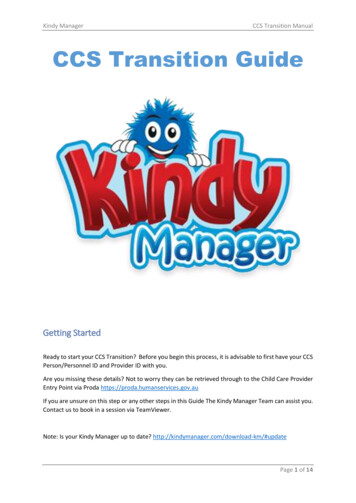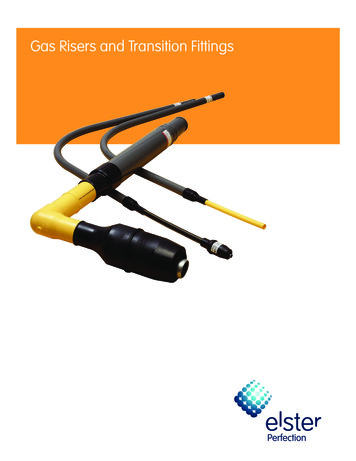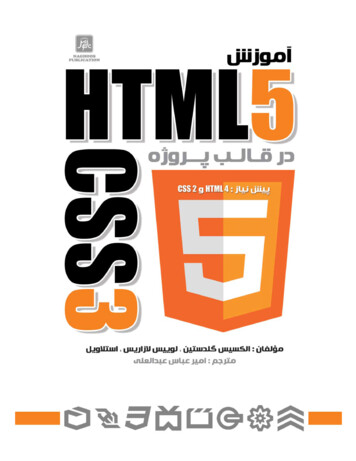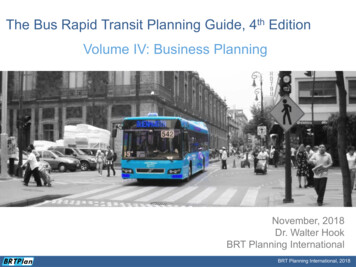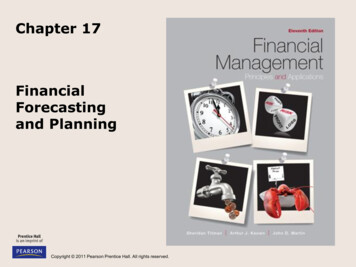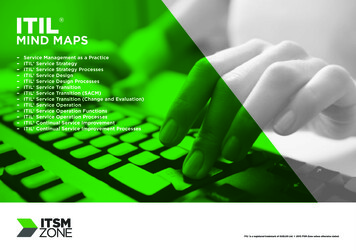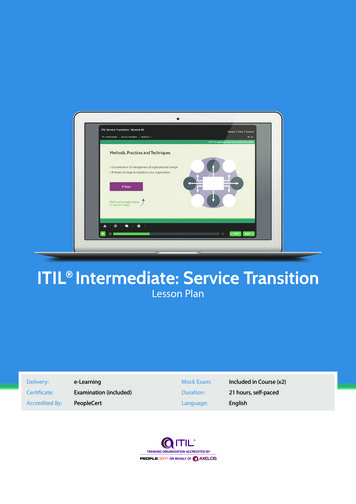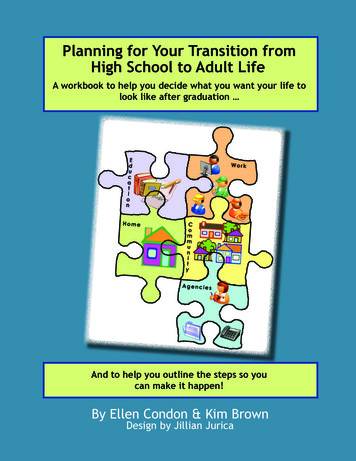
Transcription
Planning for Your Transition fromHigh School to Adult LifeA workbook to help you decide what you want your life tolook like after graduation And to help you outline the steps so youcan make it happen!By Ellen Condon & Kim BrownDesign by Jillian Jurica
Table of ContentsTransition from school to adult life: It’s never too early to startplanning5What do I want my life to look like after high school?Step One: Answer the question, “What is my day going tolook like after high school?”9What do I do now? How much help and support do people giveme now? What are my skills and abilities today?Step Two: Assess how you are doing right now.23How do I get from where I am now to where I want to be when Igraduate?Step Three: Make a list of what you could learn to do, or whatsteps you could take to get closer to these goals before yougraduate.35What agencies can help me get to where I want to be aftergraduation?Step Four: Think about who can help you meet your goals andcontinue setting new ones.45Planning Workbook1
About the Rural InstituteThe Rural Institute: Center for Excellence in Disability Education, Research, andService, is one of sixty-four Centers for Excellence in Disability Education across thenation. It is an inter-disciplinary organization that promotes full participation in rurallife for individuals with disabilities. The Rural Institute accomplishes this goal bydeveloping and disseminating innovations in teaching, research, community supports,and policy advocacy.This publication was produced by the Transition Projects at The Rural Institute:Partnerships for Transition, which is funded under a contract with the MontanaCouncil on Developmental Disabilities, and MT-TIRC (#90DN0223/01), awarded bythe U.S. Department of Health and Human Services, Administration for Children andFamilies, Administration on Developmental Disabilities. The focus of this publicationis on work associated with these Rural Institute Transition projects.Opinions expressed here do not necessarily reflect the positions or policies of thefunding organizations. These are a few of the many projects at The Rural Institute.This publication does not encompass all of the projects and activities currentlyunderway at The Rural Institute as a whole.The Rural Institute:Center for Excellence in Disability Education, Research, and Service634 Eddy, 009 CHC, University of MontanaMissoula, MT 59812Telephone: (406) 243-4134, TT: (406) 243-4200, FAX: (406) 243-4730Web Site: http://ruralinstitute.umt.edu/transition2Planning Workbook
The purpose of this workbook is to help youth to take the leadin planning for their adult lives. The workbook shares importantinformation, encourages youth to begin thinking about life afterhigh school, and offers ideas they can use to plan routes to reachtheir goals. This is not a workbook parents, educators or othersshould hand to young adults and ask them to complete on theirown. Rather, it should be used as a guide for conversations,either one-to-one or in groups, between adults and between youngpeople. The workbook includes suggested activities, but don’t belimited to these - be creative!Note to Teachers:You might want to photocopy the “activity” pages of this workbookand keep the extra copies in a binder. This way, you can use theworkbook with multiple students.Planning Workbook3
4Planning Workbook
Transition from school toadult life: It’s never tooearly to start planningWhile graduation from high school is a natural life event for many teenagers, forstudents with disabilities this requires more planning, negotiation, and decisionmaking. Your choices about where you want to live and work and whether or not youwant to continue your education are a bit more challenging if you will need continuedsupport or accommodations. High school is the last time you will be “entitled” toreceive services. So make the most of your time there. Have a plan for when yougraduate and connect with new supports or service agencies before you graduate fromhigh school.IDEA 2004, the law that directs schools about helping you plan for your adult life,states that Transition Planning must be part of the Individualized Education Program(IEP) which covers the time period when you turn 16. That means that your IEP teamwill want to know what your goals are for after you leave high school. For example,where do you want to live? Who do you want to live with? Do you plan to rent anapartment or buy a home? What will you do for work? What will you do for fun?What places or events will you want to go to in your community? How will you getaround?These post-school goals will help you and your team decide what classes you shouldtake and what things would be helpful to teach you to prepare you for the adult lifethat you want. Even though the IEP doesn’t start talking about life after school untilyou are 15 or 16, you and your family need to start thinking about your future muchearlier. Parents don’t usually wait until their kids are 16 to talk to them about gettinga job and supporting themselves after high school - start talking and thinking NOWabout what you want your life to be like once you no longer attend high school.Encourage your parents to have high expectations for you. Have high expectationsfor yourself.Once Transition starts being discussed at your IEP meetings, you need to be invitedto the meetings so you can add your input. It is your life after all! This workbookPlanning Workbook5
is meant to help you think about Transition and what you want to do, what youneed to learn in school, and what supports you might need to live, work and play asindependently as possible. For you to direct your future at your IEP meetings it willhelp if you think about this ahead of time and go to your meetings prepared.To prepare for your first Transition Planning meeting, think about all your strengths the things you are good at. If you need help, ask your family, friends, and teacherswhat they think you are good at. Make a list and bring it with you to your meeting.Also make a list of things you like to do, your interests. Most importantly, spendsome time thinking about what you want your day to look like the day after yougraduate from high school. Fill out this workbook and bring it to your TransitionPlanning meeting to make sure that your IEP team knows what your thoughts areabout your future.There are four steps to planning your transition from high school to adultlife.STEP ONE: ANSWER THE QUESTION, “WHAT IS MY DAY GOINGTO LOOK LIKE AFTER HIGH SCHOOL?”STEP TWO: ASSESS HOW YOU ARE DOING RIGHT NOW.STEP THREE: MAKE A LIST OF WHAT YOU COULD LEARNTO DO, OR WHAT STEPS YOU COULD TAKE TO GETCLOSER TO THESE GOALS BEFORE YOU GRADUATE.STEP FOUR: THINK ABOUT WHO CAN HELP YOU MEETYOUR GOALS AND CONTINUE SETTING NEW ONES.This workbook will help you take these steps one at a time.6Planning Workbook
My TimelineFill in the blanks below with a pencil. Cut along thedotted lines and put your timeline in a place where you will see itoften. Update the timeline each year.My TimelineToday’s Date:Date I will graduate:I haveyear(s) to work towardhow I want my life to look after graduation.Things I should do this year:Planning Workbook7
8Planning Workbook
What do I wantmy life to look likeafter high school?Planning Workbook9
STEP ONE: ANSWER THE QUESTION, “WHAT IS MY DAY GOINGTO LOOK LIKE AFTER HIGH SCHOOL?”The following pages list questions for you to answer. Your answers will help youplan what your days may look like after high school. You can write your answers inthe spaces provided below or there is a page following each set of questions for eitherdrawing pictures or pasting pictures cut out of magazines that show your answers.EDUCATION/TRAININGWould you like to attend college? If so, why? What would you like to learn? Wouldyou like to participate in a degree program, audit classes, or take classes that are ofparticular interest to you?Would you like to learn a trade such as construction? Welding? Auto mechanics?Cooking or food preparation?What about an apprenticeship program where you work alongside someone whoknows how to do the things you want to learn and they teach you as you helpthem? (There are formal apprenticeship programs or informal opportunities in yourcommunity.) What types of things might you like to learn through an apprenticeshipprogram?If you think on-the-job training might be a good way to learn a new job, have youthought about supported employment services? With supported employment, a personcalled a job coach helps you find and learn a job in the community. Once you learnthe job and you and your employer feel comfortable that youcan do the job on your own, the job coach won’t be with youat the job anymore.10Planning Workbook
Education/Training(If it helps you to draw or paste pictures that show what additionaleducation or training you want after graduation, do that here.)pleExamPlanning Workbook11
WORK/EMPLOYMENT (Authors’ Note: Anyone can work in their communityregardless of the severity of their disability. Employment may look different foreach of us.)Do you plan to work after graduation?What type of work will you do?How many hours a day are you likely to work?What type of help might you need to find a job? Apply for the job? Learn and do thejob? Keep the job?Will you own your own business?12Planning Workbook
Work/Employment(If it helps you to draw or paste pictures that show what kind of jobyou want after graduation, do that here.)pleExamPlanning Workbook13
HOMEWhere will you live after you graduate from high school?Will you live with your family? Friends? Or do you plan to live alone?Do you want to live in town where you are close to stores and neighbors or do youwant to live out in the country with more space?What type of help might you need to live in the community?Will you rent an apartment or a house? Own a house or condo?14Planning Workbook
Home(If it helps you to draw or paste pictures that show where you want to liveafter graduation, do that here.)pleExamPlanning Workbook15
COMMUNITYMake a list of where you want to go and what you want to doin your community.What would help you do more of these activities and get to these places?How will you get around? Is there a bus system where you live? Will you drive, rideyour bike, carpool with friends, or walk to where you want to go?Where will you go for fun?What services will you access? (For example, grocery stores, recreation opportunities,restaurants, doctor’s offices, and banks.)Will you want to have a volunteer position or help out in your community?Will you vote?16Planning Workbook
Community(If it helps you to draw or paste pictures that show what thingsyou want to do in your community and how you will get to the placesyou want to go after graduation, do that here.)pleExamPlanning Workbook17
Create Day TimersHere is another exercise to help you think about what life will look like after yougraduate. For this exercise, you will fill out two day timer pages. The first page is fora day when you are still in school. Write down what you do all day, including thingslike where and when you eat your meals, how you get to school, what your classesare, what you do for fun after school and in the evenings, etc.Example of Current Day Timer18Planning Workbook
Now it’s your turn. Fill out this day timer page by writing down what you do all dayright now, while you are still in school. Your page will probably look pretty full sinceyou spend much of your day in classesPlanning Workbook19
This day timer page is for a day after you’ve graduated. Write down what you wantyour day to look like when you’re finished with high school.Example of Day Timer for After Graduation20Planning Workbook
Now it’s your turn. Fill out this day timer page by writing down what you’d like tobe doing after you’ve graduated. Try to have your day be as full as it was when youattended school.Planning Workbook21
22Planning Workbook
What do I do now?How much help and supportdo people give me now?What are my skills andabilities today?Planning Workbook23
STEP TWO: ASSESS HOW YOU AREDOING RIGHT NOW.To help you think about what you need to learn to do for yourself before yougraduate from high school, think about what you do now and how much supportyou are getting. You don’t need to be totally independent to work, live, or play inyour community, but there might be skills you can learn, supports you can use, or away to do things differently so you can participate as much as you are able.EDUCATION/TRAININGWhat are your academic skills (for example, reading, writing, math, using computers,etc.)?What accommodations or help do you use to participate at school? (Examples ofaccommodations include taped books and lectures, large print, oral tests and reports,extended times for tests and assignments, a paraprofessional to remind you what todo, a peer mentor who helps you in class, etc.)What things do you get help doing at school?If you don’t read or do math, what strategies do you use to get these things done?If you have people who provide support to you in an activityor class (like a paraeducator or an aide), what do they do foryou?24Planning Workbook
WORK/EMPLOYMENTWhat work experiences have you had in school? In the community? At home?What chores and responsibilities do you have at home?What are you good at doing?What do you need help with when you are working or doing your chores?What’s the best way to teach you a new job so you can do it well and as independentlyas possible?Planning Workbook25
List all the chores, in-school jobs and community jobs that youhave tried. For each one, indicate what you liked best and leastabout that job. Talk about what types of help you received to dothat job.Chores/Jobs26What I liked bestPlanning WorkbookWhat I liked leastHelp I received
Here is an activity a parent, other family member, or teachercan do with you. Ask that person to take pictures of you doingdifferent work tasks that you have tried before (for example,shelving library books, feeding the dog, vacuuming your room,selling Girl Scout cookies to a neighbor, drilling holes for a curtainrod, fixing the motor on your scooter, making bread ) Tell that person whatyou liked and disliked about each task and have them write down what you say.Tell them what you did well and what you needed help doing with each task andhave them write that down, too.TaskWhat I likedbestWhat I likedleastWhat I didwellHelp IreceivedPlanning Workbook27
HOMEWhen you are at home, what kinds of things do you do?What do you do on the weekends, during the summer, or on other days when youdon’t have school?What’s the best way to help you learn new things around the house (like cooking,laundry, yard work, etc.)?Are there any safety issues for you at home? (For example, would you need helpgetting out of the house in case of a fire or do you need someone close by whenyou’re bathing in case you have a seizure?)Do you use the phone? Who do you call?Do you spend time at home by yourself?Do you remember to take your medication each day? Does anyonehelp you take your medication (for example, open the bottles, countthe pills, give you the insulin injection, etc.)?28Planning Workbook
Write down your typical routine for a school day from the timeyou wake up until the time you go to bed. Put a next to theactions you do by yourself and put a * next to the actions thatsomeone helps you with.School DayDaily RoutinePlanning Workbook29
Write down your typical routine for a weekend day or schoolvacation day, from the time you wake up until the time you go tobed. Put a next to the actions you do by yourself and put a *next to the actions that someone helps you with.Weekend or School Vacation DayDaily Routine30Planning Workbook
Have someone take photos or a videotape of you completing thechores and other responsibilities you have at home. If someonehelps you with these chores and responsibilities, describe howthey help or ask them to describe how they help. (For example, dothey remind you it is time to do the chore? Check your work tosee if it is right? Physically help you?)Chore/ResponsibilityWho helps?How do they help?Planning Workbook31
COMMUNITYWhere do you go for fun in your community?Where else do you go in your community (for example, the doctor, grocery store,hardware store, restaurant, etc.)?Who helps you go shopping at the grocery store, access the local gym, go to yourfavorite restaurant, or visit the doctor? How do they help you?How do you communicate with people in your community? (For example, through asign language interpreter, using a communication device, writing notes when peopledon’t understand you, or by using eye movements and gestures, etc.)How do you get to where you want to go?32Planning Workbook
Draw or paste a picture of your house in the middle of this page.Around your house, draw or paste pictures of all the places whereyou go now in your community. If there are other places whereyou would like to go but you haven’t yet, draw or paste pictures ofthem and put a circle around each one of them. You might wantto do this activity on a piece of flipchart paper or large dry erase board insteadso you will have more room.Planning Workbook33
Now make a list of skills you could learn or things that wouldhelp you get to and enjoy more of the places you would like to go.List of things I could learn tohelp me get to and enjoy placesI want to go.34Planning Workbook
How do I get from whereI am now to where I want to bewhen I graduate.Planning Workbook35
STEP THREE: MAKE A LIST OF WHAT YOU COULD LEARN TO DO,OR WHAT STEPS YOU COULD TAKE TO GET CLOSER TOTHESE GOALS BEFORE YOU GRADUATE.Think back to the first two steps you took in this workbook. You started by creating avision of what you want your life to look like after graduation and then you painted apicture of where you are today.Next it’s time to think about what you might need to learn or practice or experienceto get from where you are now to the life you want to have after high school. Thismight include steps like trying new things at work and at home, volunteering in yourcommunity, visiting an adult developmental disabilities agency or an IndependentLiving Center, learning to use technology that will help you participate more fully,or gathering information about different housing options. On the path to your vision,there will be steps that you will need to take, but there will also be steps your parents,your teachers, and/or other people providing services to you will need to take.Life AfterHighSchoolWhere YouAre Now36Planning Workbook
EDUCATION: What skills do you need to learn to complete yourhigh school course work and gain skills for adulthood (academicand life skills that will help you get ready to meet your adultgoals)?Here are some activities that can help you get ready for adult living. Putcheckmarks by the activities you plan to try. Learn to follow a schedule or to use a checklist to remind you what to do nextinstead of having someone tell you what is next. Learn about safety in the community and at home so you can do more things onyour own. Practice explaining how you learn best and what you need for accommodationsor help. Explore technology that will help you read and write more easily. Visit a local college. Pick up a course catalog. Meet with the DisabilityServices for Students to see what supports are offered. Google your state’s Job Corps Programs and read about the various courses ofstudy they offer. Choose someone in the community who works in a job that you are interestedin. Interview them about how they learned to do that job. What kind of trainingdid they receive? Where did they get the training? Are there other places youcould get the same kind of training?Planning Workbook37
EMPLOYMENT: What things help you learn how to dosomething new? What help do you need to get a job? Forexample, do you need someone with you when you learn a newtask? Do written instructions help? Is it better if you can seea model or example of what you’re supposed to do? Would itbe helpful if you could practice completing job applications and job interviewswith someone you trust or would it be best for someone to represent you to anemployer and create a one-of-a-kind job for you?Here are some activities that can help you prepare for having a job in yourcommunity. Put checkmarks by the activities you plan to try. Increase your chores and responsibilities at home. Sample various job types through volunteering or work experiences. Get a paid job. Visit an agency in your community that provides supported employment toadults. Visit agencies that can help you find a job such as: Job Service, VocationalRehabilitation or Workforce. Meet with adult agencies such as Developmental Disabilities or Mental Healthto explore what they provide for employment supports. Participate in job experiences in the community (a community-based workassessment) to determine what environments, supports, and tasks will help youto be most successful. Visit your assistive technology center to see if they have any ideas aboutgadgets or strategies that can help you work more independently. Learn about Customized Employment.38Planning Workbook
COMMUNITY EXPERIENCES: What skills do you need tolearn to participate in your community as independently andactively as possible? What skills do you need to learn so you canaccess the businesses, services, and recreational opportunities youwant and need to access? Are there other things that would helpyou participate more in your community?Here are some activities that can help you prepare for an active community life.Put checkmarks by the activities you plan to try. Learn to shop for meals or learn to use a shopping service. Learn to make purchases or come up with strategies that you can use to shop byyourself without learning math. (For example, use a debit card, write a check,charge groceries, etc.) Attend a class at the YMCA. Learn to go to a movie with a friend or by yourself. Join a community interest group. Visit your local Independent Living Center and ask about peer mentors, classesor self-advocacy groups. Come up with strategies to make yourself understood to unfamiliar people. Practice asking about whether or not a hotel, restaurant or business is accessible. Find a list of non-profit agencies in your community that need volunteers. Find out how to register to vote. If you aren’t going to drive, learn various ways to get to where you want togo (calling a friend or coworker and asking for a ride, walking safely in yourcommunity, taking the bus, etc.).Planning Workbook39
POST-SCHOOL ADULT LIVING: What do you need to learnto live as independently as possible? What services, supports, ortechnology would help you live as independently as possible?Here are some activities that can help you prepare to live as independently aspossible. Put checkmarks by the activities you plan to try. Think about the daily activities where you rely on someone else for help. Nowthink about ways you could be more independent in each of these activities. Take a first-time home buyer’s class. Learn about HUD and Section 8 housing. Find out how to rent an apartment. Visit a friend who lives on their own and interview them about what kinds ofthings they needed to learn to do so. Explore group living options such as: an apartment with friends or people whowould provide some support to you in exchange for rent, group homes andsupported living. Inquire about services through Developmental Disabilities if you will needongoing support to live in the community. Apply for SSI. Learn to manage your own doctors’ appointments and medications. Learn money management and budgeting. Open a checking account. If people are concerned about you living in the community by yourself,think about all the strategies you could learn that would help you live moreindependently and safely in the home of your choice. Visit your assistivetechnology center to help you think of options. Explore the possibility of having someone provide support to you in your ownhome.40Planning Workbook
RELATED SERVICES: What related services will you continueto need after graduation? Examples might include: orientationand mobility assistance, help with obtaining and learning to use anew piece of technology, counseling, using public transportationor arranging rides to work, physical therapy, nursing services,personal care Here are some activities that can help you plan for the services you will needafter you graduate. Put checkmarks by the activities you plan to try. Research what physical therapy, occupational therapy and speech therapyservices are available in your area for adults. Find out who provides theseservices. Learn how to hire and direct your own personal care attendant. Make a list of all the activities your family helps you with now that a personalcare attendant would need to provide in a new situation, such as college. Meet with Vocational Rehabilitation to ask about funding for services for peoplewho are deaf and hard of hearing, blind, and/or who use technology. Connect with Personal Care Services if you need medical assistance at home.Planning Workbook41
DAILY LIVING SKILLS: What daily living activities (likepaying bills, cleaning and maintaining a house, preparing meals,doing laundry, and taking care of your personal hygiene) do youneed to learn how to do? What daily living activities will youcontinue to need help with after you graduate?Here are some activities that can help you learn and practice daily living skills.Put checkmarks by the activities you plan to try. Have your parents go through their monthly bills with you and show you how theypay each bill. Develop a household budget showing what your expenses might be after yougraduate and how much income you will need to meet those expenses. Learn how to fix a leaky faucet. Help paint something like a fence, porch or bedroom. Do your own laundry each week. Plan and cook a meal for your family once a week. Search the Internet for simple recipes you might want to try. Practice keeping yourself clean and brushing your teeth twice a day.42Planning Workbook
FUNCTIONAL VOCATIONAL EVALUATION: This can be formal or informal.It is a strategy used to get an idea of what someone’s skills, abilities and supportneeds are in terms of employment. A functional vocational evaluation can beperformed by the school or by an employment vendor in the community. Theprocess should help you understand what environments and supports work bestfor you and identify different tasks that you could do in the community. Thisassessment should NOT determine whether or not you are ready to work in thecommunity. It should describe the conditions (including supports) that willenable you to be most successful in a community job.Your IEP team will discuss whether or not you would benefit from a FunctionalVocational Evaluation.Planning Workbook43
44Planning Workbook
What agencies can help me get towhere I want to beafter graduation?Planning Workbook45
STEP FOUR: THINK ABOUT WHO CAN HELP YOU MEET YOURGOALS AND CONTINUE SETTING NEW ONES.A big part of planning for your life after high school is thinking about whatservices and supports you might need once you graduate. For example, whatkind of supports might you need to get the job that you want? To live asindependently as possible in your community? To lead an active life?The people who help you at school are not usually the same people who willhelp you after you graduate. A major part of Transition Planning is connectingyou and your family with adult agencies who might provide or pay for servicesas you are finishing high schooland after you exit high school.The school is required to helpyou and your family identifyand connect with the appropriateagencies.Many times, adult agencyrepresentatives will be invited toyour IEP meeting or informationfrom the agencies will be sharedat your meeting. It is up to youand your family to follow throughwith each agency, to apply for their services, and to complete their eligibilityprocesses. Your transition from high school will be smoother if you connect withthe agencies that will help you after graduation BEFORE you exit school.Important differences between schools and adult agencies:1. If you are a student with a disability and you qualify for special educationservices, the schools must provide you with those services. This is calledan entitlement. Once you exit high school, services are provided byadult agencies. You have to apply for the services and even if you applyand meet all the qualifications, you may not receive the services or maynot receive them right away. This is because adult services are based oneligibility and availability.2. There are waiting lists for some adult services. Even if you qualify forservices as an adult, you may have to wait until an agency can serve you,or you might have to find other ways to get the help you need.46Planning Workbook
3. In schools, most services that you need are coordinated by one person,your special education teacher or case manager. After graduation,you or a family member might need to coordinate your own services.(Sometimes a Developmental Disabilities or Mental Health case managercan help with this but not always.)4. Eligibility requirements may be different for children and for adults.They may also be different for people who are still in school and thosewho are finished with school.Planning Workbook47
Which agencies or services couldhelp me to reach my goals?There a many different agencies, programs and services that might be able to helpyou reach your goals. The following pages will tell you about some of the resourcesavailable. Yo
about what you want your life to be like once you no longer attend high school. Encourage your parents to have high expectations for you. Have high expectations for yourself. Once Transition starts being discussed at your IEP meetings, you need to be invited to the meetings so you can



